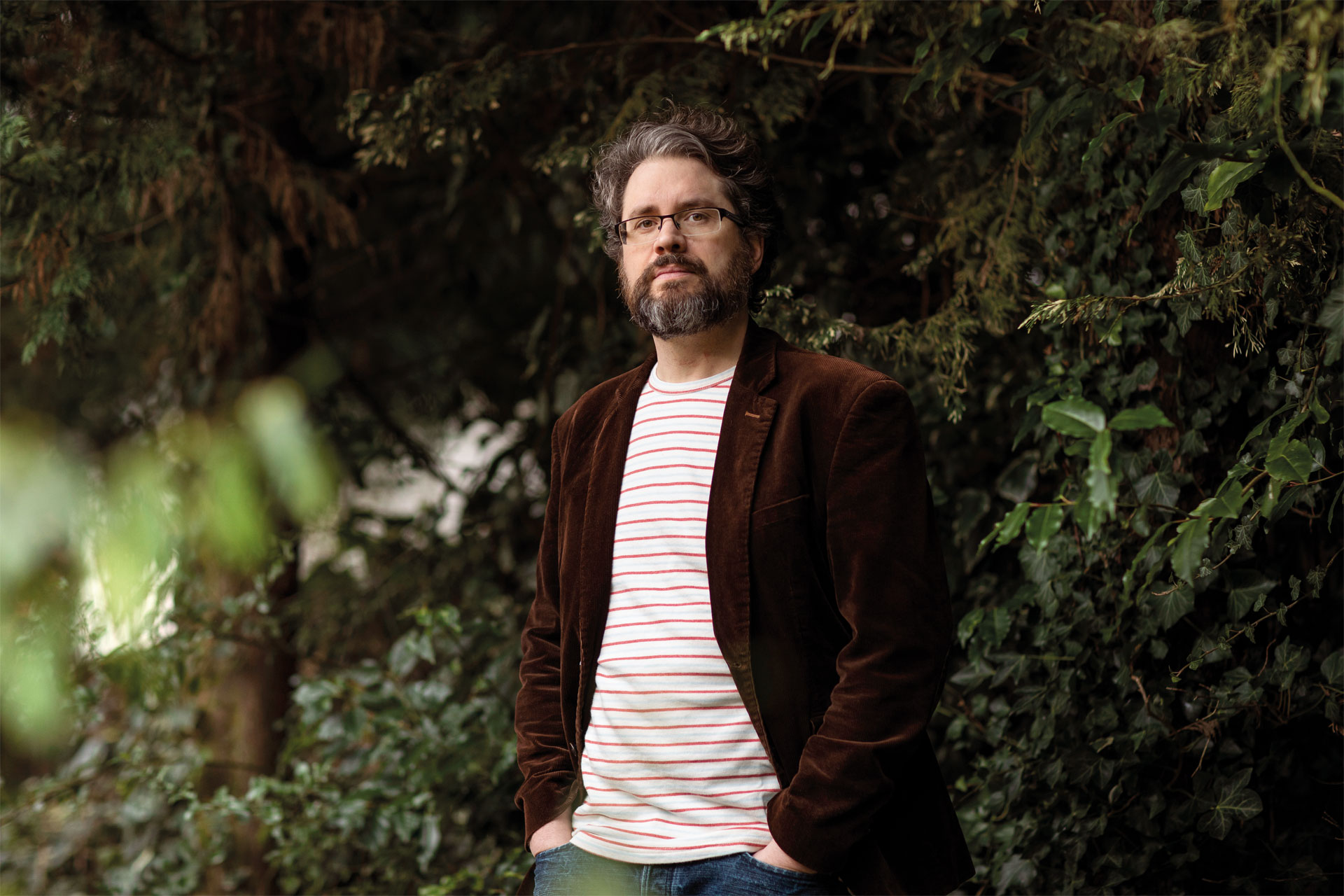
- HOME
- CULTURE
Exclusive Interview: Eliot Higgins, founder of Bellingcat
The cyber-sleuther saving the world
By | 1 year ago
He was described by Jeremy Paxman as his hero and James O’Brien as ‘the most important journalist you’ve never heard of’, but what Lucy Cleland wants to know about Bellingcat founder, Eliot Higgins, is how it feels to find out the truth about the world’s biggest wrongdoings – and, of course, what his favourite snack is.
Exclusive Interview with Eliot Higgins
The next time you’re about to lose your rag at your child who has just spent yet another hour tucked away in their bedroom on their computer, stop, draw a breath and whisper the name Eliot Higgins. You never know, your little screen addict might one day become one of the heroes of our age. Not that Eliot, founder of Bellingcat, an investigative journalism group that specialises in fact-checking and open-source intelligence, would ever want to be described thus. But it’s too late, Eliot: even the BBC’s fearsome inquisitor, Jeremy Paxman, has called you his hero.
If you haven’t heard of Eliot or, indeed Bellingcat, then quite frankly where have you been hiding? He and his global network of internet sleuths have cracked some of the biggest cases of wrongdoing (to say the least) in recent history – with no formal investigative training, no journalism degrees and no big corporate or government backing.
Bellingcat and their high-profile cases
How then? You may well ask. By sitting at their computers for hours on end, trawling the internet and geolocating – that is determining the geographic position of an object – and cross-referencing it with reams and reams of social media footage that anyone could find should they be so inclined. Theirs is evidence-collecting and verifying extraordinaire.
To rattle off just a few of their cases: they proved who was responsible for the downing of Malaysian Airlines MH17 plane in Ukraine in 2014 (the Russians); who poisoned Yulia and Sergei Skripal in Salisbury in 2018 (the Russians); and who poisoned Alexei Navalny with nerve-agent in 2020 (the Russians). There’s a trend here, of course, so it’s not surprising that Putin and his offensive against Ukraine (and others) suck up a lot of Bellingcat’s working hours. But it was the war in Libya, then Syria (and the misinformation disseminating from the regions) that essentially got angry young keyboard warrior Eliot hooked on fact verification back in 2011. At the time, he was a blogger named ‘Brown Moses’ who spent a lot of time in forums and comment sections.
‘I liked to argue with people,’ he says, but found that is was helpful to have the evidence to back up his disputes.

It’s not surprising that Putin and his offensive against Ukraine (and others) suck up a lot of Bellingcat’s working hours
And we are in an era when the truth is under threat like never before – we live in times when even a recent former President of the United States of America subverted its meaning so unashamedly, launching his own Twitter-esque platform, called Truth Social, and doesn’t see the irony. The good guys have to keep up at pace. Without the smartphone technology that can mobilise revolutions (witness the Arab Spring), however, Eliot and his troupe would not be able to do what they do.
Doing it for justice
And why does he do it? It’s certainly not for personal glory. Whereas an investigative journalist might be gunning for a scoop, along with a Pulitzer Prize, Eliot says he wants more than just to tell a story; he wants to enable justice, engender change and provide accountability, so the bad guys can be eventually – and rightfully – brought down. Even Bellingcat is set up as a foundation where Eliot, as its founder, can be sacked for stepping out of line. He literally is one of the good guys.
When meeting Eliot on Zoom at his rented house in Leicester (he’s mid-move), I’d half expected to see a chubby man with a haggard-looking complexion and heavy bags under his eyes, given what he must have to look at on a daily basis (sarin-gassed children, for example). In fact, I’m forced to comment on how good he looks – his skin is soft, wrinkle-free, dewy-almost, and there’s attractive grey running through his plentiful dark hair (he’s 43). And far from empty bags of Doritos and beer cans littering a dingy backroom office, he’s more partial to a pistachio nut (unsalted), listening to Impressionist piano works of the turn of the 20th century (Ravel and Satie, in particular), and the only thing he has on his desk is his MacBook Pro. ‘My wife is very much into healthy living and organic food. We never eat processed food and all I’ll drink is either water [usually filtered at that], green tea or filtered coffee,’ he says without batting an eyelid.
So far, he’s no Hemingway nor internet trope – though, he might well have been. As our conversation continues, I conclude that Eliot has a lot to thank his wife and children (a girl, 11, and a boy, eight) for. A child of the 1980s, who had an obsession with computers – constantly on his ZX Spectrum – Eliot ‘probably had undiagnosed ADHD’. Looking back, he says that he was quite shy, ‘a loner’, so, ‘I just withdrew into myself and then got used to my own company’. Nowadays, you’d worry about that kid – introverted, closed curtains, computers, finding their tribe in the murkier recesses of the web – so I’m guessing he could have gone another way instead of becoming a man who pisses off Putin. It was, he admits, ‘not a conscious decision, but one of those things that happens to you in life that takes you one way or another. For me, it was about making the right friends and meeting the right people and reading the right things and not the wrong things.’ (Listen up, QAnoners.)
Parenting in a digital age
Nor is he happy about his children spending too much time online (just like those Silicon Valley techpreneurs who fessed up they don’t let their own children have smartphones in 2020 documentary The Social Dilemma). ‘We’re really strict about it,’ says Eliot. ‘The games nowadays have an element of addiction that really didn’t exist before. I think that’s actually quite dangerous for a young mind because it feeds into the brain the idea of a reward system and it can cause addictions in a way that really hasn’t been an issue before.’ And then there’s social media and the pressure of image his daughter (and just as likely his son too nowadays) will no doubt feel. Eliot has the wit to realise that he’s a complete hypocrite, though, given how much he is online.
He’s keen too, however, not to point the finger of blame entirely at the tech companies and doesn’t believe a set of draconian laws will have much impact on the corrosive side of being online. ‘What I’m more focused on is looking at the question of how we actually reach young people to make them engage online in a more positive way. One thing that I’ve learned from Bellingcat is the importance of building communities and how empowering that can be to an individual, even if it’s a small contribution. We are working with a UK-based organisation at the moment and in the very early stations of designing a school curriculum that includes an element of open-source investigation training.’
Teaching open-source investigation in schools? How refreshing; how progressive; how enlightened. ‘It’s not just to show [children] how to be investigators, but how to be positive contributors and good online citizens in society. Unless we are proactive about doing that and actually teach people how these things can be used positively, showing them that you can be part of networks that can feed into more important things, we won’t move forward.’ I’ve never heard a politician speak this way; can we get him into the Department of Education immediately, please, instead of the current proclivity for engendering fear and loathing of everything online.
‘This is something I observe every day,’ says Eliot, referencing the community aspect of being online. ‘With the conflict in Ukraine, we’ve seen that these ad hoc online communities, who are focused on the conflict, are very effective at debunking disinformation coming from Russia. Also through things like geolocating a video, we’ve been able to feed that into a data set that we can verify, and we’re now providing that to a range of different accountability organisations. That kind of small individual act is being fed into something that’s much larger. We need to make people aware that’s something that they can do, and be part of, and show them how to do that. If we don’t, then it’s no wonder they will show up on 4Chan [an anonymous message board mostly devoted to threads of conversation about racism, conspiracies, and fascist dogma] being Nazis.’
Balancing act
How does he switch off from work that by its nature is constantly developing and can be history-making? ‘Generally, I make sure that at the weekends I’m not doing work stuff. In the early days of Bellingcat when I was trying to get things going, I’d work all the time. It’s taken nearly eight years to get to a point where I can switch off in the evening and sit with my wife to watch some TV series on Netflix and not think about work.’ (Current favourite shows are Severance and Stranger Things). Social media, he admits, has destroyed his ability to read novels. ‘I read so much but it’ll be reports and official things. But when I get the chance, I love Ted Chiang, who writes short science fiction stories.’
And what about his mental health given what he’s confronting on a daily basis? ‘It’s really important to be aware of that in this line of work, both for myself and for the people that we work with. I make sure that our staff [currently numbering around 30] have therapy sessions available for free, anytime they want it. And we encourage them just to talk, giving them a space where they know they can talk about anything they want to in a non-judgmental way.’
I comment that his wife must be quite a woman to put up with someone whose life could literally be in danger (given Putin’s proclivity for poisoning those who speak out against him): ‘I think she’s happy now that [Bellingcat] has become something stable. Because when you’re a blogger who’s relying on crowdfunding [which Eliot did for three years before Bellingcat became a properly financed organisation in 2018], it’s not the most stable situation.’ Yes, but what about the fear of assasination? ‘The first time we published a big article on the GRU [the Soviet military intelligence organisation] about being involved in the Skripal poisoning, I thought it was really going to annoy some very dangerous people. That was quite scary.
‘If I’m in a hotel I won’t have room service and I have various security things that I use in the room to make sure that it’s secure even when I’m not there. I’ll always carry my devices with me no matter where I go, so it’s all those extra little steps you have to take.’ It’s not just the Russians, though, that he has to be wary of, ‘it’s the crazy people off the internet’ too. ‘I’m more worried about [them] because they can be harder to spot until they’re right in your face.’
When not cracking cases, Eliot is in constant conversations with production companies and working on feature documentaries. The success of the recent Navalny film earlier this year showed just how powerful this medium can be for impactful storytelling. He also wrote a book We Are Bellingcat (which tells the story of the genesis of the organisation and goes into some of the cases they’ve solved) last year, and did a podcast on the breaking of the MH17 case. His overarching aim is to open up as many people in as many places to the values of open-source investigation, so he’s continually working out how to further his reach; not for a power grab, but because he knows that the more people doing the work, the more accountability there will be and, ideally, the more bad apples will be brought down.
‘When I started doing this 10 years ago barely anyone even thought to do what I was doing with videos and photographs from conflict zones,’ he says. ‘Now it’s unthinkable for any news organisation, human rights NGO, policy-maker, or international accountability not to use that sort of evidence to understand the ongoing conflict in Ukraine. I think a lot of that is down to the work we’ve done at Bellingcat to train and educate people, and I’m very proud to see it being used so widely, and to such great effect.’
Proud he should be. Oh, and did I also mention that he sometimes solves the odd stolen dog story? A true hero of our times.
Featured portrait of Eliot by Fabio De Paola, fabiodepaola.com







